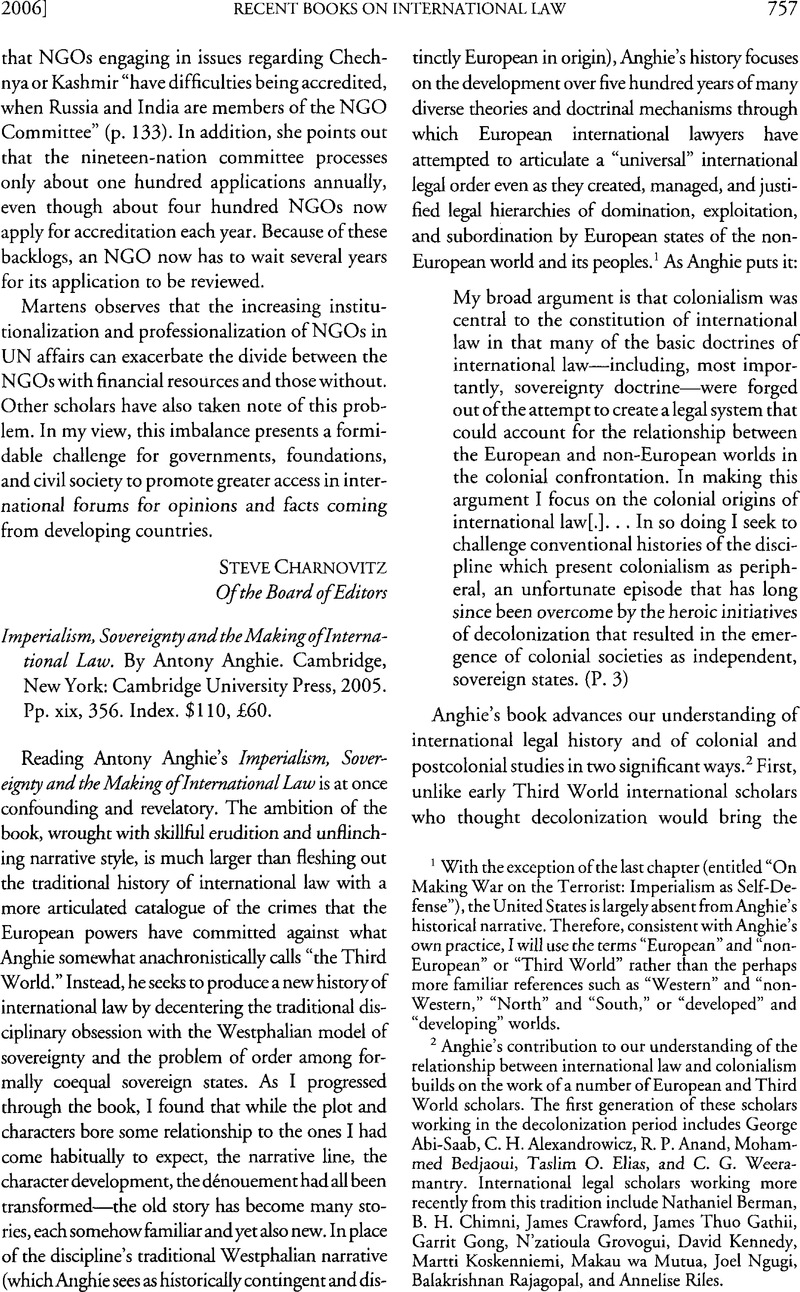Article contents
Imperialism, Sovereignty and the Making of International Law. By Antony Anghie. Cambridge, New York: Cambridge University Press, 2005. Pp. xix, 356. Index. $110, £60.
Published online by Cambridge University Press: 27 February 2017
Abstract

- Type
- Recent Books on International Law
- Information
- Copyright
- Copyright © American Society of International Law 2006
References
1 With the exception of the last chapter (entitled “On Making War on the Terrorist: Imperialism as Self–Defense”), the United States is largely absent from Anghie’s historical narrative. Therefore, consistent with Anghie’s own practice, I will use the terms “European” and “non– European” or “Third World” rather than the perhaps more familiar references such as “Western” and “non–Western,” “North” and “South,” or “developed” and “developing” worlds.
2 Anghie’s contribution to our understanding of the relationship between international law and colonialism builds on the work of a number of European and Third World scholars. The first generation of these scholars working in the decolonization period includes George Abi–Saab, Alexandrowicz C. H., Anand R. P.Mohammed Bedjaoui, Taslim, O. Elias, and Weeramantry C. G.. International legal scholars working more recently from this tradition include Nathaniel Berman, Chimni B. H., James Crawford, James Thuo Gathii, Garrit Gong, N’zatioula Grovogui, David Kennedy, Martti Koskenniemi, Makau wa Mutua, Joel Ngugi, Balakrishnan Rajagopal, and Annelise Riles.
3 Compare “Nation–states of different religions increasingly came into contact with each other . . . on a basis of equality and mutual respect for sovereignty. . . . In a strict sense, therefore, the history of the modern law of nations begins with the emergence of independent nation–states from the ruins of the medieval Holy Roman Empire, and is commonly dated from the Peace of Westphalia (1648)[,]” in Historical Introduction to Lori, Fislerdamrosch, Louis, Henkin, Richard, Crawford Pugh, Oscar, Schachter, & Hans, Smit, International Law: Cases and Materials, at xxvii, xxviii (4th ed. 2001), A Classic And Much Used International Law Casebook in the United States Google Scholar.
4 Compare id. at xxxi (“Although positivism has a number of different meanings and nuances, its essential meaning in the theory and development of international law is reliance on the practice of states and the conduct of international relations as evidenced by customs and treaties, as against the derivation of norms from basic metaphysical principles. The rise of positivism in Western political and legal theory, especially from the latter part of the 18th century to the early part of the 20th century, corresponds to the steady rise of the national state and its increasingly absolute claims to legal and political supremacy.”).
5 Compare id. at xxxiii–xxxiv (describing the interwar period without mention of the Mandate System or the management by the Mandatory Powers of the Mandate territories).
6 Compare id. at xxxiv–xxxvi (focusing on the proliferation of international institutions and the complex, but largely successful, assimilation of non–Western societies into the family of nations through UN accession).
7 Compare id. at xxxvi (focusing on the end of the Cold War, collective security, and humanitarian intervention).
8 A range of recent scholarship deploys a similar methodological decentering of traditional disciplinary narratives to illuminate the multiplicity of legal, normative, and cultural systems that make up the international legal order. For example, Hilary, Charlesworth, Christine, Chinkin, & Shelley, Wright, Feminist Approaches to International Law, 85 AJIL 613 (1991)Google Scholar, Karen, Knop, Re/Statements: Feminism and State Sovereignty in International Law, 3 Transnat’l L. & Contemp. Probs. 293 (1993)Google Scholar, and Anne, Orford, Feminism, Imperialism and the Mission of International Law, 71 Nordic J. Int’l L. 275 (2002)Google Scholar, focus on women and feminist theory in the construction of international law. Ileana, M. Porras, Constructing International Law in the East Indian Seas: Property, Sovereignty, Commerce and War in Hugo Grotius’s De lure Praedae—The Law of Prize and Booty, or “On How to Distinguish Merchants from Pirates,” 31 Brook. J. Int’l L. 741 (2006)Google Scholar, looks at the centrality of trade and the invention of the corporate form to early conceptions of international law and sovereignty. Arnulf Becker, Lorca, International Law in Latin America or Latin American International Law? Rise, Fall and Retrieval of Legal Thinking and Political Imagination, 47 Harv. Int’l L. J. 283 (2006)Google Scholar, and Liliana, Obregon, Completing Civilizations: Nineteenth Century Criollo Interventions in International Law (2002)Google Scholar (unpublished S.J.D. dissertation, Harvard Law School) (on file at the Harvard Law School Library), seek to articulate the unique attributes of Latin American international law. Alejandro Lorite, Escorihuela, Cultural Relativism the American Way: The Nationalist School of International Law in the United States, 5 Global Jurist Frontiers, No. 1 (2005)Google Scholar, at <http://www.bepress.com/gj/frontiers/>, seeks to elaborate a unique “United Statesian” approach to international law. Martti, Koskenniemi, The Gentle Civilizer of Nations: the Rise and Fall of International Law (2002)Google Scholar, explores the significance of European liberalism in the development of international law. Nathaniel, Berman, “But the Alternative is Despair”: European Nationalism and the Modernist Renewal of International Law, 106 Harv. L. Rev. 1792 (1993)Google Scholar, examines the significance of European nationalism and modernist aesthetics in international law theory and practice during the interwar period. William, J. Aceves, The Economic Analysis of International Law: Transaction Costs Economics and the Concept of State Practice, 17 U. PA. J. Int’l Econ. L. 995 (1996)Google Scholar, and Joel, P. Trachtman, The Theory of the Firm and the Theory of the International Economic Organization: Toward a Comparative Institutional Analysis, 17 Nw. J. Int’l L. & Bus. 470 (1997)Google Scholar, focus on the centrality of economic theory to international law. Annelise, Riles, Note, Aspiration and Control: International Legal Rhetoric and the Essentialization of Culture, 106 Harv. L. Rev. 723 (1993)Google Scholar, and Karen, Engle, Culture and Human Rights: The Asian Values Debate in Context, 32 N.Y.U. J. Int’l L. & Pol. 291 (2000)Google Scholar, explore the significance of different conceptions of culture in the international law and human rights discourses.
- 4
- Cited by


